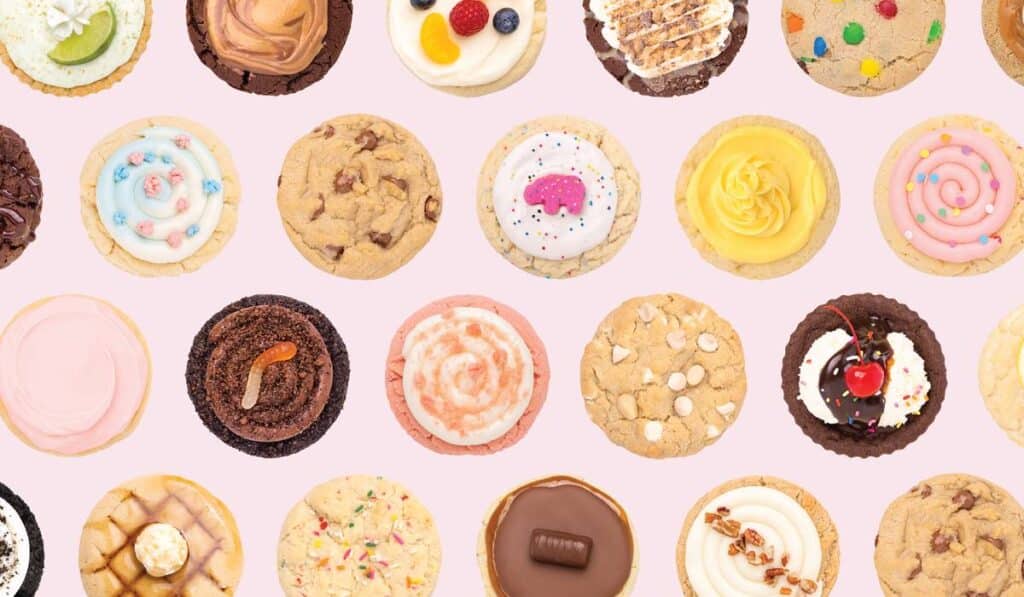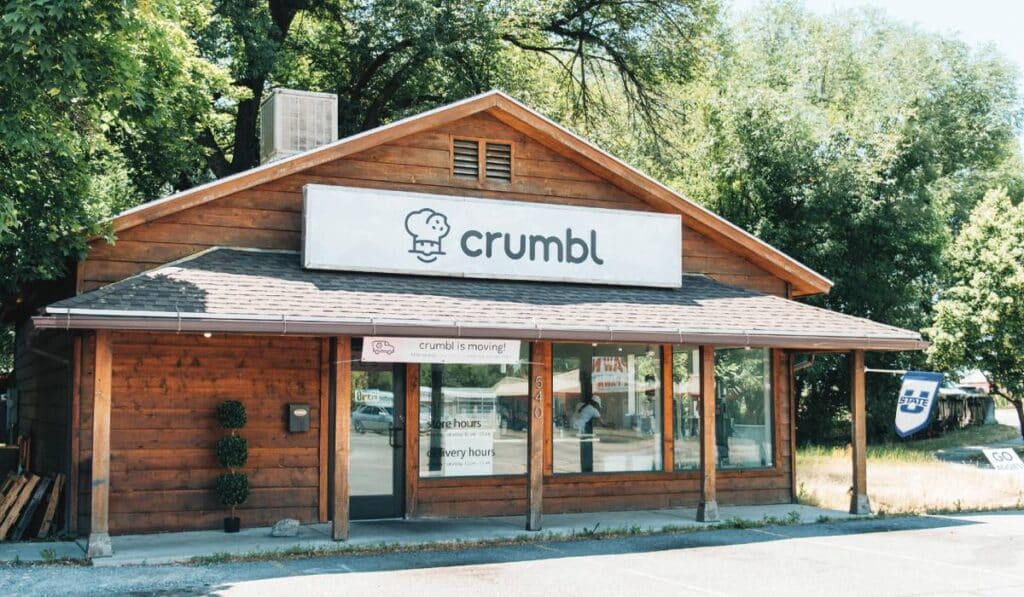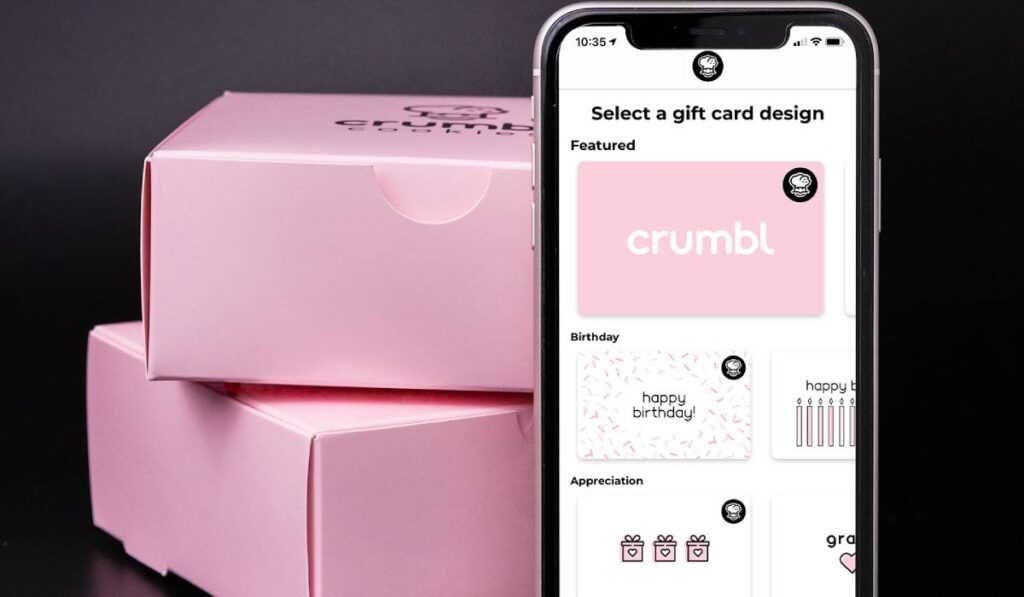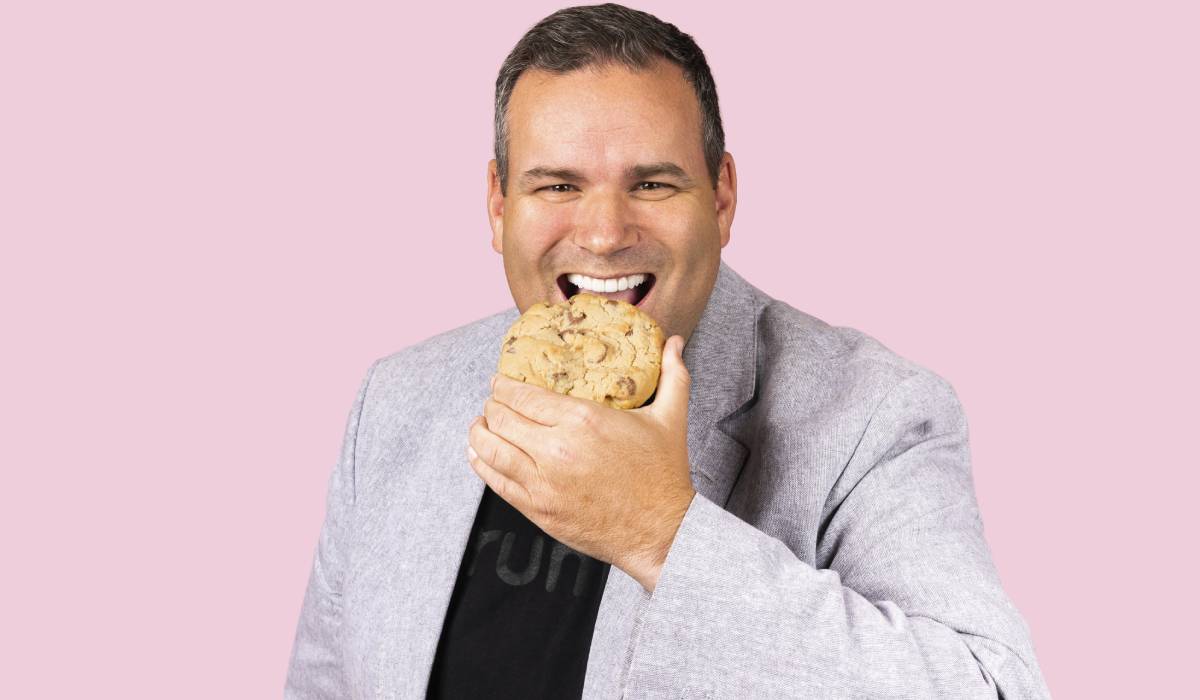On September 27, Crumbl Cookies celebrated its sixth birthday.
While most brands are still in the emerging stage of their journey at this point, the term falls short of appropriately describing where the cookie chain has gone in less than a decade.
The correct term would be category leader. In just six years, Crumbl is everywhere in the U.S., quite literally. As of October, the company skyrocketed to roughly 920 locations in 50 states and Canada, making it by far the biggest cookie concept in North America. The brand opened a net of 87 shops in 2020, followed by 184 in 2021 and 363 in 2022. Hundreds of outlets have opened in 2023 as well.
The closest brand to Crumbl in terms of unit count is Great American Cookies, a 360-unit chain founded 46 years ago.
“I think strategically for us we thought this is an amazing new space and there’s an opportunity to capture market share,” says co-founder and CEO Jason McGowan. “Our vision was to move fast across the United States so you wouldn’t have an In-N-Out and a Whataburger fight 10, 20, 30 years from now. We wanted to capture the hearts and the minds of our customers as fast as we could across the nation in a healthy way.”
Crumbl’s digital footprint is also extraordinary, with 7.1 million TikTok followers as of October. This engagement has captured the hearts and minds of Gen Z and millennials, especially with highly anticipated weekly flavor reveals. To provide some perspective, Crumbl’s follower count surpasses that of Starbucks and Nike combined.
“Crumbl really went from this small bakery to a really iconic brand that people have real experiences and memories with,” McGowan says.
Rising to the Cookie Throne
Crumbl was the direct result of “two crazy cousins”—McGowan and Sawyer Hemsley—coming together to create differentiation in Logan, Utah.
Beforehand, Hemsley studied communications with a dual minor in marketing and multimedia and McGowan was big into technology and product management. The two had been in business together before and were eager for the next venture. They asked themselves, what would people love in Logan that’s nostalgic and solving a need? The rural community is green, surrounded by mountains, filled with farmland, and accessible to college students via Utah State University. What was missing, Hemsley says, is a fun food concept that’s based on a premium dessert.
Cookies were the prevailing answer, although neither had any experience in the food business. The naysayers were in their ears, questioning how the duo could possibly create a dessert that was better than simply going to the store and buying pre-made dough.
But Hemsley and McGowan were headstrong. The initial idea was around delivering hot, freshly baked cookies to front doors, a segment that hadn’t been cracked yet in Logan. They proceeded to rent a building—a former restaurant that was scheduled to be demolished—buy equipment, and put together a business plan. This was all completed before having an actual product.

“We had yet to perfect the chocolate chip cookie,” says Hemsley, who serves as chief brand officer. “And so we did it backwards, which we always laugh about, and that’s why they call us the ‘two crazy cousins.’ But we were determined to find the best. We researched, we networked, we read books, watched YouTube until we infused this recipe that we felt really, really good about.”
After tinkering with ingredients and listening to honest opinions from friends, family, and others, Hemsley and McGowan opened in 2017 with one item and flavor on the menu, a chocolate chip cookie. The cousins began the bakery just hoping it would work.
Their nervousness was met with lines out of the door. They anticipated many delivery calls but soon found that customers enjoyed the in-store experience. Crumbl is known for its pink, white, and black color scheme, inspired by Hemsley’s dad’s best friend in Preston, Idaho, who used to drive a vintage pink Cadillac with a black and white interior. In the summer, Crumbl Pink—used for all of the brand’s cookie boxes—was recognized by Pantone as an official color.
From the start, the company’s mission was to create meaningful memories among friends and family. The cookies are large and meant to be shared. Crumbl even sells a cutter that can slice the dessert into four pieces.
“People actually smile when they walk in,” Hemsley says. “They’re not hungry, they’re not looking for food, they’re looking for a sweet treat that they’re craving. It’s enjoyable to be able to infuse that into our stores, into our culture. We always tell our staff and our employees here at HQ, and in our stores as well as our franchise partners, when people walk through the threshold of a Crumbl, we want them to leave the worries of the world behind them. We want them to be able to just embrace the smell and the atmosphere and the energy that comes from baking cookies. Having that little moment in their day just brightens it and makes it more joyful.”
As many in quick service do, the chain turned to the franchising model. As the footprint widened, so did the cookies. Crumbl currently has 200-plus unique flavors, with six rotating through each week. Milk Chocolate Chip and Semi-Sweet Chocolate Chunk alternate every week while the remaining five come from the vault, new and previously used.
The brand uses a proprietary model to determine which cookies will be in the lineup. McGowan calls it a “mixed bag of a lot of different metrics” and a team backed by data science. Crumbl, which isn’t open on Sundays to allow employees to rest and relax, uses that day to announce flavors across its social media platforms.
“It is absolutely insane if you think about where we are as a company, and we only have one product,” McGowan says. “We have several flavors, but we only have one product. We only have one item. We have a cookie. I mean, yeah, we have bottles of water and those kinds of things. But if you look at any other brand, they’ve got all kinds of sides and different options. Like even the simplest menu out there that you could see, it is still complicated compared to what we have as far as focus. We do think there’s lots of opportunity to try and add other things to our menu. We feel like we’re not even close. There could be lots of growth in the company with new menu items.”
McGowan doesn’t anticipate running out of ideas, adding that “We didn’t realize how much we love cookies.” Not all of them are a success, like the Bubblegum version. Crumbl welcomes that type of feedback. Social media users even came up with “#crumblreview,” in which customers post videos explaining what they liked or didn’t like about a certain week’s round of flavors.
Crumbl now uses the hashtag itself, showing that it’s listening to what customers want. It’s a big part of why guests feel such a connection with the brand, McGowan explains.
“What was their feedback on that cookie? What did they like? What would they want to change?” The CEO says. “As we saw that feedback and those communications from our customers, we were able to change and incorporate those into the cookies.”
Hemsley oversees the research and development team involved with concocting cookie flavors. His favorite meeting every day is 3 p.m. when he gets to taste test. He’s enjoyed every innovation, but there are a few that hold a special place in his heart.
There’s the Nilla Bean Cupcake, named after his dog, Cornbread and Blueberry Muffin, which reminds him of his childhood in Idaho, and Chocolate Cake, another one of his favorite desserts.
“You may not notice a lot of cherry flavors on our menu,” Hemsley chuckles. “It’s because I don’t like cherry. But we’re getting past that and I’m having an open mind, and really, I want what our customers want, so you’ll see some cherry flavors here soon. But my favorite cookies are the flavors that are nostalgic to me personally.”

From Crazy Cousins to Cookie Creators
There was no big, master plan to grow Crumbl in the early days. The momentum was just too hard to ignore at a certain point.
“As soon as we started getting a bunch of stores, we’re like, ‘Wait, these are working. This could work. This could work throughout the United States,’” McGowan says. “And then we just started opening our stores and decided to go for it. We went for it and things went crazy and things were awesome. It’s been absolutely a pleasure and an amazing journey ever since I’ve started.”
Crumbl starts each month by posting a graphic of North America on social media that drops pins at every location it’s opening. In September, 36 stores debuted across 18 states and one Canadian province.
The pace is swift, but controlled, McGowan says. Before opening a store, franchisees fly to Utah to attend Crumbl University—a full facility with mixers and ovens that the CEO likens to “The Great American Baking Show.” There, onsite trainers coach operators on how to make the best cookie, including proprietary techniques the company has learned over the years. After that, some operators work at other shops to gain additional experience. And when it comes time to open the unit, another team arrives to train management on how to bake and use the technology.
“When you open six or seven stores, you’re sending out over a dozen people to these different stores to really open up and stay with them a period of time to make sure that they understand everything about Crumbl,” McGowan says. “Then after that, the owners really step up and we have people that live in those locations that go and make sure they’re managed and run well in those areas.”
The strategy has proven fruitful. Earlier this year, Crumbl made its debut on the QSR 50, an annual ranking of the top 50 biggest quick-service chains in terms of U.S. systemwide sales. The cookie brand was No. 38, earning $1 billion in sales last year and generating an AUV of $1.84 million.
Crumbl is sold out in the U.S., with roughly 250-300 shops in the pipeline. That’s without the brand spending a dime on advertising its franchise opportunity. The company only had a simple link at the bottom of its website labeled “franchising.” McGowan says the growth came through operators trying the product for the first time and deciding, “I want to be part of Crumbl. I love the brand. I love the experience and I want to be part of it.” Those same people who open one store want to tack on three, four, or five more, the CEO adds.
Following blistering expansion, McGowan says the next phase will be slower to ensure Crumbl is healthy and manageable. He wants the system to catch its breath, grab more customers, and build AUVs. Additionally, he foresees more whitespace opportunities in international markets like Canada and the U.K.
“It’s an interesting strategy, and we think it’ll pay off,” McGowan says. “And again, we don’t think it’s going to be perfect. We think there may be a mistake on a store location or that sort of thing. But I think we got to a really good spot and I think we nailed the first phase of the strategy. So now it’s going to be a little bit more strategic on where we place locations, the timing.”
Much of the brand’s growth is rooted in technology thanks to McGowan’s background in software. Prior to Crumbl, he and a team built Facebook’s “We’re Related” app from inception to 120 million users.
Franchisees have access to an internally built app where they check metrics like sales, volume, and labor in real-time. Product quality is paramount as well. After a customer orders, they have the opportunity to upload photos of their cookies. These pictures are accessed by headquarters and then rated by the support center. To remove any biases, this review process is done without knowing which store the pictures came from. Franchisees are able to look at these cookies and check how they are performing compared to peers.
“When you arm them with data, they know how to solve these problems and how to fix these things internally, to get them to that next level, to get them a little bit faster, to get the quality a little bit better, to make sure the experience in the store and what their guests and the customers are experiencing are great and phenomenal, from opening the box to making sure people see the quality is there,” McGowan says.
Crumbl also designed its own website, mobile app, and POS system. For digital orders, customers can check in when they are at the store and the app will respond with what number they are in line. The technology is so seamless that Crumbl launched curbside pickup in a matter of weeks when shops shut down nationwide due to the COVID pandemic.

For guests walking in, there are self-order kiosks. The layout—typically an in-line space that’s 1,400 to 2,000 square feet—provides an open view of the entire baking process. While other concepts prepackage materials and make dough offsite, Crumbl creates all of its materials from scratch. That’s combined with a menu that changes on a weekly basis.
“It’s constant learning and there’s a lot of operational skill and acumen that’s involved in these high-volume stores to actually produce that many cookies,” McGowan says. “It’s been really, really fun to see. It’s amazing when you put somebody in a box, they’ll figure out how to maximize their opportunity.”
The Recipe of Success
Crumbl employees operate based on three Cs—customer service, cookie quality, and cleanliness.
“We’re oftentimes quoted to be the Apple store of cookies because of our technology, our clean hygienic stores, and just the smoothness of the entire flow from start to finish,” Hemsley says.
But really, it’s a family-oriented business. In addition to Hemsley and McGowan being cousins, their friends, siblings, college roommates, and neighbors own franchises. Dentists, doctors, and lawyers left their careers to open a shop because it “brings more happiness to them and their family and financial freedom,” Hemsley explains.
The concept is about helping people spend time together, and that doesn’t always mean inside the store. The brand gave HQ workers paid time off on Fridays during the summer so they could be with loved ones. That philosophy comes from the top; McGowan never wanted to be so successful that it came at the cost of not spending time with his children.
It’s also why Crumbl closes on Sundays. McGowan says there were doubters who believed the chain wouldn’t survive outside of Utah because of this move. He knew it would because “When you take care of people, you take care of your customers, you take care of your employees, you take care of your crew members, take care of your franchise partners, things start to work out.”
But don’t get McGowan wrong, Crumbl has made mistakes along the way, whether it was opening in a town that’s too small or launching a poorly performing cookie. However, when he looks at the chain as a whole, he feels like the brand has made a “small little dent into the happiness of people’s lives.”
Hemsley never thought six years later he would be discussing pink frosting and sprinkles over a conference table. He was set to work in Arizona at an advertising agency after college, but he and McGowan left their careers because they saw the potential of what Crumbl could be. In the first couple of years, they never dreamed of it reaching where it is now, but Hemsley owes that to his attention to detail and McGowan’s vision.
“I feel like we had a golden partnership that’s been able to push boundaries, adapt where it is needed to innovate through COVID, and build a team that is so passionate and fiery and energetic about a brand that it’s been such an almost easy, smooth ride,” Hemsley says. “Everyone is just so excited about the growth of Crumbl and the product and the service that we have in the industry. I would never have guessed I would have been here, but I’m so excited we are and I wouldn’t have changed anything.”
On the front wall at every location is a framed picture of the first unit in Logan. For McGowan, it’s a reminder of when he and Hemsley had their first customer service issues. It’s where they were completing deliveries until one to two o’clock in the morning.
It wasn’t the building that made the duo great, McGowan says. It was the maniacal focus on coming up with the best chocolate chip cookie.
“A lot of times when people get successful, they throw that stuff away or don’t care about stuff,” McGowan says. “And for us, we’ve always got to remember who we are and where we came from. And so it’s always been something that’s really exciting to us and really motivational to us to remember who we are.”







